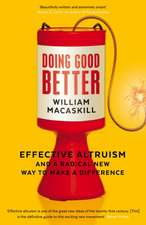The Social Psychology of Morality: Sydney Symposium of Social Psychology
Editat de Joseph P. Forgas, Lee Jussim, Paul A. M. Van Langeen Limba Engleză Paperback – 19 feb 2016
This volume makes a case for the pivotal role of social psychology as the core discipline for studying morality. The book is divided into four parts. First, the role of social psychological processes in moral values and judgments is discussed, followed by an analysis of the role of morality in interpersonal processes. The sometimes paradoxical, ironic effects of moral beliefs are described next, and in the final section the role of morality in collective and group behavior is considered.
This book will be of interest to students and researchers in the social and behavioral sciences concerned with moral behavior, as well as professionals and practitioners in clinical, counseling, organizational, marketing and educational psychology where issues of ethics and morality are of importance.
| Toate formatele și edițiile | Preț | Express |
|---|---|---|
| Paperback (1) | 461.03 lei 43-57 zile | |
| Taylor & Francis – 19 feb 2016 | 461.03 lei 43-57 zile | |
| Hardback (1) | 1114.70 lei 43-57 zile | |
| Taylor & Francis – 19 feb 2016 | 1114.70 lei 43-57 zile |
Din seria Sydney Symposium of Social Psychology
-
 Preț: 342.57 lei
Preț: 342.57 lei -
 Preț: 357.26 lei
Preț: 357.26 lei -
 Preț: 480.02 lei
Preț: 480.02 lei -
 Preț: 436.14 lei
Preț: 436.14 lei -
 Preț: 436.14 lei
Preț: 436.14 lei -
 Preț: 416.22 lei
Preț: 416.22 lei - 25%
 Preț: 823.17 lei
Preț: 823.17 lei - 15%
 Preț: 464.31 lei
Preț: 464.31 lei -
 Preț: 486.49 lei
Preț: 486.49 lei - 21%
 Preț: 330.92 lei
Preț: 330.92 lei - 15%
 Preț: 453.50 lei
Preț: 453.50 lei - 22%
 Preț: 331.60 lei
Preț: 331.60 lei - 18%
 Preț: 1005.80 lei
Preț: 1005.80 lei -
 Preț: 372.07 lei
Preț: 372.07 lei -
 Preț: 413.37 lei
Preț: 413.37 lei -
 Preț: 414.48 lei
Preț: 414.48 lei - 15%
 Preț: 462.65 lei
Preț: 462.65 lei - 15%
 Preț: 438.96 lei
Preț: 438.96 lei -
 Preț: 471.77 lei
Preț: 471.77 lei -
 Preț: 371.76 lei
Preț: 371.76 lei
Preț: 461.03 lei
Preț vechi: 542.39 lei
-15% Nou
Puncte Express: 692
Preț estimativ în valută:
88.22€ • 92.34$ • 73.43£
88.22€ • 92.34$ • 73.43£
Carte tipărită la comandă
Livrare economică 31 martie-14 aprilie
Preluare comenzi: 021 569.72.76
Specificații
ISBN-13: 9781138929074
ISBN-10: 1138929077
Pagini: 344
Dimensiuni: 152 x 229 x 18 mm
Greutate: 0.45 kg
Ediția:1
Editura: Taylor & Francis
Colecția Routledge
Seria Sydney Symposium of Social Psychology
Locul publicării:Oxford, United Kingdom
ISBN-10: 1138929077
Pagini: 344
Dimensiuni: 152 x 229 x 18 mm
Greutate: 0.45 kg
Ediția:1
Editura: Taylor & Francis
Colecția Routledge
Seria Sydney Symposium of Social Psychology
Locul publicării:Oxford, United Kingdom
Cuprins
Contents
Chapter 1. In Search of homo moralis: The Social Psychology of Morality. Joseph P. Forgas, University of New South Wales, Lee Jussim, Rutgers University, and Paul A. M. Van Lange, VU University of Amsterdam.
Part I. The Nature of Moral Values and Decisions.
Chapter 2. God Save Us: A Terror Management Perspective on Morality. Tom Pyszczynski, University of Colorado Colorado Springs
Chapter 3. Moral Opportunities versus Moral Tests. Dale T. Miller and Benoît Monin, Stanford University.
Chapter 4. Threat, Morality and Politics: A Differentiated Threat Account of Moral and Political Values. Simon M. Laham and Chelsea Corless, Melbourne School of Psychological Sciences, University of Melbourne.
Chapter 5. Computational Modeling of Moral Decisions. Molly J. Crockett, Department of Experimental Psychology, University of Oxford
Chapter 6. Understanding Responses to Moral Dilemmas: Deontological Inclinations, Utilitarian Inclinations, and General Action Tendencies. Bertram Gawronski, University of Texas at Austin, Paul Conway, University of Cologne, Germany, Joel B. Armstrong, University of Western Ontario, Canada, Rebecca Friesdorf, Wilfrid Laurier University, Canada, and Mandy Hütter, University of Tübingen, Germany.
Part II: Moral Aspects of Interpersonal Behavior.
Chapter 7. A Relational Perspective of Social Influence on Moral Issues. Jeffry A. Simpson, University of Minnesota, Allison K. Farrell, University of Minnesota and Emma Marshall, University of Canterbury, New Zealand.
Chapter 8. When Perspective-Takers Turn Unethical. Adam D. Galinsky and Alice Lee, Columbia University.
Chapter 9. Confessing to an Immoral Act: Consequences to Moral Beliefs and Inferences about Moral Dispositions. Joel Cooper, Princeton University.
Chapter 10. Affective Influences on Moral Decisions: Mood Effects on Selfishness vs. Fairness. Joseph P. Forgas, University of New South Wales, Australia.
Part III: Ironic and Paradoxical Effects of Morality
Chapter 11. Can High Moral Purposes Undermine Scientific Integrity? Lee Jussim, Rutgers University, New Brunswick and The Center for Advanced Study in the Behavioral Sciences, Stanford, Jarret T. Crawford, The College of New Jersey, Sean T. Stevens, Rutgers University, New Brunswick, Stephanie M. Anglin, Rutgers University, New Brunswick, and Jose L. Duarte, Arizona State University.
Chapter 12. Concept creep: Psychology’s Expanding Notions of Harm and their Moral Basis. Nick Haslam, University of Melbourne.
Chapter 13. Ethical Norms and Moral Values among Scientists: Applying Conceptions of Morality to Scientific Rules and Practices. Klaus Fiedler, University of Heidelberg.
Part IV. Morality and Collective Behavior.
Chapter 14. Moralization and Intolerance of Ideological Outgroups. Mark J. Brandt, Tilburg University, Geoffrey Wetherell, DePaul University, Jarret T. Crawford, The College of New Jersey.
Chapter 15. Sin, Morality, and Opponent Motives for Prosocial Behavior. William G. Graziano, Purdue University and David A. Schroeder, University of Arkansas.
Chapter 16. The Moral Psychology of Resource Use. Brock Bastian and Daniel Crimston, University of New South Wales
Chapter 17. Of Baboons and Elephants: Inequality and the Evolution of Immoral Leadership. William von Hippel, University of Queensland, Richard Ronay, VU University Amsterdam and William W. Maddux,INSEAD, France.
Chapter 18. Groups Create Moral Superheroes to Defend Sacred Values. Jeremy A. Frimer, university of Winnipeg, Canada.
Chapter 1. In Search of homo moralis: The Social Psychology of Morality. Joseph P. Forgas, University of New South Wales, Lee Jussim, Rutgers University, and Paul A. M. Van Lange, VU University of Amsterdam.
Part I. The Nature of Moral Values and Decisions.
Chapter 2. God Save Us: A Terror Management Perspective on Morality. Tom Pyszczynski, University of Colorado Colorado Springs
Chapter 3. Moral Opportunities versus Moral Tests. Dale T. Miller and Benoît Monin, Stanford University.
Chapter 4. Threat, Morality and Politics: A Differentiated Threat Account of Moral and Political Values. Simon M. Laham and Chelsea Corless, Melbourne School of Psychological Sciences, University of Melbourne.
Chapter 5. Computational Modeling of Moral Decisions. Molly J. Crockett, Department of Experimental Psychology, University of Oxford
Chapter 6. Understanding Responses to Moral Dilemmas: Deontological Inclinations, Utilitarian Inclinations, and General Action Tendencies. Bertram Gawronski, University of Texas at Austin, Paul Conway, University of Cologne, Germany, Joel B. Armstrong, University of Western Ontario, Canada, Rebecca Friesdorf, Wilfrid Laurier University, Canada, and Mandy Hütter, University of Tübingen, Germany.
Part II: Moral Aspects of Interpersonal Behavior.
Chapter 7. A Relational Perspective of Social Influence on Moral Issues. Jeffry A. Simpson, University of Minnesota, Allison K. Farrell, University of Minnesota and Emma Marshall, University of Canterbury, New Zealand.
Chapter 8. When Perspective-Takers Turn Unethical. Adam D. Galinsky and Alice Lee, Columbia University.
Chapter 9. Confessing to an Immoral Act: Consequences to Moral Beliefs and Inferences about Moral Dispositions. Joel Cooper, Princeton University.
Chapter 10. Affective Influences on Moral Decisions: Mood Effects on Selfishness vs. Fairness. Joseph P. Forgas, University of New South Wales, Australia.
Part III: Ironic and Paradoxical Effects of Morality
Chapter 11. Can High Moral Purposes Undermine Scientific Integrity? Lee Jussim, Rutgers University, New Brunswick and The Center for Advanced Study in the Behavioral Sciences, Stanford, Jarret T. Crawford, The College of New Jersey, Sean T. Stevens, Rutgers University, New Brunswick, Stephanie M. Anglin, Rutgers University, New Brunswick, and Jose L. Duarte, Arizona State University.
Chapter 12. Concept creep: Psychology’s Expanding Notions of Harm and their Moral Basis. Nick Haslam, University of Melbourne.
Chapter 13. Ethical Norms and Moral Values among Scientists: Applying Conceptions of Morality to Scientific Rules and Practices. Klaus Fiedler, University of Heidelberg.
Part IV. Morality and Collective Behavior.
Chapter 14. Moralization and Intolerance of Ideological Outgroups. Mark J. Brandt, Tilburg University, Geoffrey Wetherell, DePaul University, Jarret T. Crawford, The College of New Jersey.
Chapter 15. Sin, Morality, and Opponent Motives for Prosocial Behavior. William G. Graziano, Purdue University and David A. Schroeder, University of Arkansas.
Chapter 16. The Moral Psychology of Resource Use. Brock Bastian and Daniel Crimston, University of New South Wales
Chapter 17. Of Baboons and Elephants: Inequality and the Evolution of Immoral Leadership. William von Hippel, University of Queensland, Richard Ronay, VU University Amsterdam and William W. Maddux,INSEAD, France.
Chapter 18. Groups Create Moral Superheroes to Defend Sacred Values. Jeremy A. Frimer, university of Winnipeg, Canada.
Notă biografică
Joseph P. Forgas is Scientia Professor of Psychology at the University of New South Wales, Sydney. He received his D.Phil. degree from the University of Oxford and a D.Sc degree, also from Oxford. His research investigates affective influences on social cognition, motivation, and behavior. He has published 26 books and over 200 journal articles and book chapters. In recognition of his scientific contribution, he received the Order of Australia in 2012, as well as the APS’s Distinguished Scientific Contribution Award, the Humboldt Research Prize, and a Rockefeller Fellowship. Forgas is a Fellow of the Academy of Social Sciences in Australia, the Association for Psychological Science, the Society of Personality and Social Psychology, and the Hungarian Academy of Sciences.
Lee Jussim is professor of psychology at Rutgers University, where he was chair from 2010-2013. He is the author of over 100 articles and chapters, and several books, including Social Perception and Social Reality: Why Accuracy Dominates Bias and Self-Fulfilling Prophecy, which received the 2013 AAP Prose Award for best book in psychology. His contribution to The Social Psychology of Morality was completed while he was a Fellow and Consulting Scholar at Stanford’s Center for Advanced Study in the Behavioral Sciences. His current work focuses primarily on scientific integrity and best practices in science.
Paul A. M. Van Lange is professor of social psychology and chair of the Section of Social and Organizational Psychology at the VU University in Amsterdam, Holland, and Distinguished Research Fellow at the University of Oxford. His research focuses on human cooperation and trust grounded in evolutionary theorizing, particularly the functions of forgiveness, generosity, empathy, fairness, morality, retaliation, and competition. He is a recipient of the Kurt Lewin Medal and has published around 150 articles and several books, including the Atlas of Interpersonal Situations, the Handbook of Theories of Social Psychology, Power, Politics, and Paranoia, and Social Dilemmas. Van Lange was associate editor of the Journal of Personality and Social Psychology and Psychological Science, is founding editor of a series on human cooperation (published by Oxford University Press), editor-in-chief of Current Opinion in Psychology, and has served as director of the Kurt Lewin Institute (KLI) and as president of the Society of Experimental Social Psychology (SESP).
Lee Jussim is professor of psychology at Rutgers University, where he was chair from 2010-2013. He is the author of over 100 articles and chapters, and several books, including Social Perception and Social Reality: Why Accuracy Dominates Bias and Self-Fulfilling Prophecy, which received the 2013 AAP Prose Award for best book in psychology. His contribution to The Social Psychology of Morality was completed while he was a Fellow and Consulting Scholar at Stanford’s Center for Advanced Study in the Behavioral Sciences. His current work focuses primarily on scientific integrity and best practices in science.
Paul A. M. Van Lange is professor of social psychology and chair of the Section of Social and Organizational Psychology at the VU University in Amsterdam, Holland, and Distinguished Research Fellow at the University of Oxford. His research focuses on human cooperation and trust grounded in evolutionary theorizing, particularly the functions of forgiveness, generosity, empathy, fairness, morality, retaliation, and competition. He is a recipient of the Kurt Lewin Medal and has published around 150 articles and several books, including the Atlas of Interpersonal Situations, the Handbook of Theories of Social Psychology, Power, Politics, and Paranoia, and Social Dilemmas. Van Lange was associate editor of the Journal of Personality and Social Psychology and Psychological Science, is founding editor of a series on human cooperation (published by Oxford University Press), editor-in-chief of Current Opinion in Psychology, and has served as director of the Kurt Lewin Institute (KLI) and as president of the Society of Experimental Social Psychology (SESP).
Recenzii
After languishing for decades, the study of morality has recently prospered by means of an explosion of creative new research directions and insights. This timely and fascinating book offers a marvelous overview of many diverse contributions and perspectives, written by many of the cutting-edge researchers who helped create the explosive leap forward. Delving into the root causes of both remarkable virtue and despicable misbehavior, as well as the processes by which people form and express moral judgments, this book is a tour de force that will reward anyone interested in this key aspect of human social life, from the novice seeking an introduction to the expert wanting to know the latest findings.
Roy F. Baumeister, author of Willpower: Rediscovering the greatest human strength and Evil: Inside human violence and cruelty
There is nothing more central to what it means to be human than our moral (and immoral) behavior. Thus, understanding when and why humans do and do not behave morally is a key mission of the social sciences in general and social psychology in particular. This volume is a testament to how much progress we have made in our understanding of this critical issue. The contributing authors are the leaders in this field and together they have created a book that is a must-read for all psychologists and social scientists who want to catch up on the current science on this issue.
E. Tory Higgins, Stanley Schachter Professor of Psychology and Professor of Business, Director, Motivation Science Center, Columbia University
Roy F. Baumeister, author of Willpower: Rediscovering the greatest human strength and Evil: Inside human violence and cruelty
There is nothing more central to what it means to be human than our moral (and immoral) behavior. Thus, understanding when and why humans do and do not behave morally is a key mission of the social sciences in general and social psychology in particular. This volume is a testament to how much progress we have made in our understanding of this critical issue. The contributing authors are the leaders in this field and together they have created a book that is a must-read for all psychologists and social scientists who want to catch up on the current science on this issue.
E. Tory Higgins, Stanley Schachter Professor of Psychology and Professor of Business, Director, Motivation Science Center, Columbia University
Descriere
This volume makes a case for the pivotal role of social psychology as the core discipline for studying morality through the cutting-edge work of the world's leading researchers in the field. It examines the social psychological processes in moral values and judgments, and analyzes the role of morality in interpersonal processes and group behavior. It provides a rich resource for students and researchers in the social and behavioral sciences concerned with moral behavior, and professionals and practitioners in clinical, counselling, organizational, marketing, and educational psychology where issues of ethics and morality are of importance.

















